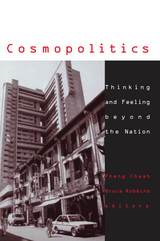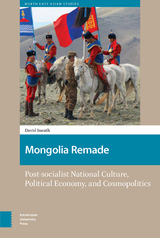4 books about Cosmopolitics

Cosmopolitics I
Isabelle Stengers
University of Minnesota Press, 2010
From Einstein’s quest for a unified field theory to Stephen Hawking’s belief that we “would know the mind of God” through such a theory, contemporary science—and physics in particular—has claimed that it alone possesses absolute knowledge of the universe. In a sweeping work of philosophical inquiry, originally published in French in seven volumes, Isabelle Stengers builds on her previous intellectual accomplishments to explore the role and authority of science in modern societies and to challenge its pretensions to objectivity, rationality, and truth.
For Stengers, science is a constructive enterprise, a diverse, interdependent, and highly contingent system that does not simply discover preexisting truths but, through specific practices and processes, helps shape them. She addresses conceptual themes crucial for modern science, such as the formation of physical-mathematical intelligibility, from Galilean mechanics and the origin of dynamics to quantum theory, the question of biological reductionism, and the power relations at work in the social and behavioral sciences. Focusing on the polemical and creative aspects of such themes, she argues for an ecology of practices that takes into account how scientific knowledge evolves, the constraints and obligations such practices impose, and the impact they have on the sciences and beyond.
This perspective, which demands that competing practices and interests be taken seriously rather than merely (and often condescendingly) tolerated, poses a profound political and ethical challenge. In place of both absolutism and tolerance, she proposes a cosmopolitics—modeled on the ideal scientific method that considers all assumptions and facts as being open to question—that reintegrates the natural and the social, the modern and the archaic, the scientific and the irrational.
Cosmopolitics I includes the first three volumes of the original work. Cosmopolitics II will be published by the University of Minnesota Press in Spring 2011.
[more]

Cosmopolitics of the Camera
Albert Kahn's Archives of the Planet
Edited by Trond Erik Bjorli and Kjetil Ansgar Jakobsen
Intellect Books, 2020
In Cosmopolitics of the Camera, the leading experts in the field present Les Archives de la Planète—Albert Kahn’s stunning collection of early color photography and documentary film—and discuss the extraordinary intellectual context from which it grew. The archives, collected between 1909 and 1932, show the cultural richness and diversity of humanity at a time of drastic geographical and historical change. Consisting of 183 thousand meters of film, 72 thousand autochromes and more than 6 thousand stereographs, it portrays the beauty and creativity of cultures whose fatal disappearance Kahn believed to be only a question of time.
The Archives of the Planet was one of a string of institutions for research and international cooperation established in Kahn’s utopian World Gardens near Paris. Some of the best-known minds of the age met there regularly to discuss the problem of how to make new media of communication serve the cause of peace and human development. Cosmopolitics of the Camera presents ten expert voices from seven different countries, studying the work of Kahn and his key collaborators, the geographer Jean Brunhes and the philosopher Henri Bergson, in the spirit of their culturally diverse venture, placing it in its proper historical and intellectual context, and exploring its ambitious achievements and failures. By pushing Kahn’s work back into active discussion, the analysis forces us to reflect on the ways our world is shaped and recorded by the media, and reactivates the time capsule that Kahn designed to communicate with the future.
The Archives of the Planet was one of a string of institutions for research and international cooperation established in Kahn’s utopian World Gardens near Paris. Some of the best-known minds of the age met there regularly to discuss the problem of how to make new media of communication serve the cause of peace and human development. Cosmopolitics of the Camera presents ten expert voices from seven different countries, studying the work of Kahn and his key collaborators, the geographer Jean Brunhes and the philosopher Henri Bergson, in the spirit of their culturally diverse venture, placing it in its proper historical and intellectual context, and exploring its ambitious achievements and failures. By pushing Kahn’s work back into active discussion, the analysis forces us to reflect on the ways our world is shaped and recorded by the media, and reactivates the time capsule that Kahn designed to communicate with the future.
[more]

Cosmopolitics
Thinking and Feeling beyond the Nation
Pheng Cheah
University of Minnesota Press, 1998

Mongolia Remade
Post-socialist National Culture, Political Economy, and Cosmopolitics
David Sneath
Amsterdam University Press, 2018
This book explores the historical and contemporary processes that have made and remade Mongolia as it is today: the construction of ethnic and national cultures, the transformations of political economy and a ‘nomadic’ pastoralism, and the revitalization of a religious and cosmological heritage that has led to new forms of post-socialist politics. Widely published as an expert in the field, David Sneath offers a fresh perspective into a region often seen as mysterious to the West.
[more]
READERS
Browse our collection.
PUBLISHERS
See BiblioVault's publisher services.
STUDENT SERVICES
Files for college accessibility offices.
UChicago Accessibility Resources
home | accessibility | search | about | contact us
BiblioVault ® 2001 - 2024
The University of Chicago Press









